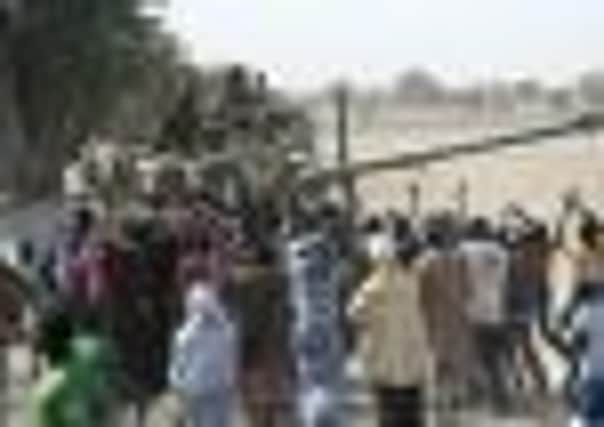Timbuktu taken from rebels without a shot fired


The recovery of Timbuktu followed the swift capture at the weekend by French and Malian forces of Gao, another major town in Mali’s north occupied by the alliance of Islamist militant groups since last year.
The two-week-old mission by France in its former Sahel colony – at the request of Mali’s government but which has wide international support – has driven the Islamist rebels northwards out of towns into the desert and mountains.
Advertisement
Hide AdAdvertisement
Hide AdWithout a shot being fired, 1,000 French soldiers and paratroopers and 200 Malian troops seized Timbuktu airport and surrounded the town, which lies on the banks of the Niger River, looking to block the escape of insurgents allied to al-Qaeda.
In Timbuktu and Gao, crowds turned out to welcome the French and Malian troops.
A third town in Mali’s vast desert north, Kidal, had remained in Islamist militant hands. But the secular Malian Tuareg MNLA rebels said yesterday they had taken charge in Kidal after Islamist fighters abandoned it.
A diplomat based in the Malian capital, Bamako, confirmed the MNLA takeover of Kidal, saying the Tuaregs were likely to try to press long-standing demands for autonomy for the region.
A French military spokesman said the assault forces at Timbuktu were being careful to avoid combat inside the city so as not to damage cultural treasures, mosques and religious shrines in what is considered a seat of Islamic learning.
But Timbuktu mayor Ousmane Halle reported that departing Islamist gunmen had set on fire a newly-built South African-funded library, which contained thousands of invaluable manuscripts.
He said his office and the home of a member of parliament had also been set alight.
Unesco spokesman Roni Amelan said the Paris-based United Nations cultural agency was “horrified” by the news of the fire, but was awaiting a full assessment of the damage.
Advertisement
Hide AdAdvertisement
Hide AdMarie Rodet, an African history lecturer at Britain’s School of Oriental and African Studies, said Timbuktu held one of the greatest libraries of Islamic manuscripts in the world.
“It’s pure retaliation. They [the Islamist rebels] knew they were losing the battle and they hit where it really hurts,” Ms Rodet said. “These people are not interested in any intellectual debate. They are anti-intellectual.”
The Ahmed Baba Institute, one of several libraries and collections in Timbuktu containing fragile documents dating back to the 13th century, is named after a Timbuktu-born contemporary of William Shakespeare and houses more than 20,000 scholarly manuscripts.
The French and Malians have encountered no resistance so far at Timbuktu, but they face a tough job of combing through the labyrinth of ancient mosques, monuments and mud-brick homes to flush out any hiding Islamist fighters.
Timbuktu member of parliament El Hadj Baba Haïdara said the Islamist rebels had abandoned the city.
“They all fled. Before their departure they destroyed some buildings, including private homes,” he said.
The Islamist forces comprise a loose alliance that groups Al-Qaeda in the Islamic Maghreb (AQIM) with Malian Islamist group Ansar Dine and AQIM splinter MUJWA.
They have retreated in the face of relentless French air strikes and superior firepower and are believed to be sheltering in the rugged Adrar des Ifoghas mountain range, north of Kidal.
Advertisement
Hide AdAdvertisement
Hide AdThe MNLA pro-autonomy Tuareg rebels have offered to help the French-led offensive against the al-Qaeda-affiliated Islamists. It was not clear, however, whether the French and Malians would negotiate with the MNLA.
“Little by little, Mali is being liberated,” French foreign minister Laurent Fabius said.